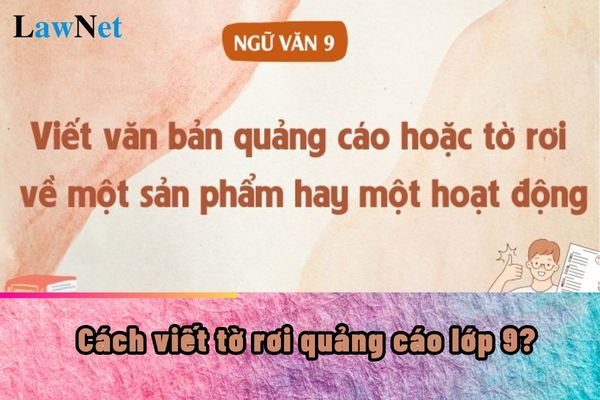What are guidelines on writing an advertising flyer for grade 9 students in Vietnam? What language skills are required when studying grade 9 Literature at lower secondary school level in Vietnam?
What are guidelines on writing an advertising flyer for grade 9 students in Vietnam?
Writing a flyer is one of the subjects that grade 9 students will learn in the Vietnamese Literature program for grade 9.
|
Guidelines on writing an advertising flyer for grade 9 * A typical flyer usually includes the following sections: |
Note: Information is for reference only./.

What are guidelines on writing an advertising flyer for grade 9 students in Vietnam? What language skills are required when studying grade 9 Literature at lower lower secondary school level in Vietnam? (Image from the Internet)
What language skills are required when studying grade 9 Literature at lower lower secondary school level in Vietnam?
Based on Section IV of the Appendix to the Lower Secondary Education Literature Curriculum issued with Circular 32/2018/TT-BGDDT, the language competence required to be achieved when learning Literature in grade 9 at the lower lower secondary school level is as follows:
* Requirements to be achieved at the lower lower secondary school level regarding language competence are as follows:
- Know how to apply Vietnamese language knowledge along with personal experiences and reasoning abilities to understand texts; know how to read texts by type; understand both explicit and implicit content of the text.
- Recognize and initially analyze and evaluate the content and notable expressive features of texts; compare texts with other texts, relate them to personal life experiences; thus forming personal views, thoughts, and perceptions of life, enriching spiritual life.
- In grades 6 and 7: be able to write narrative, descriptive, and expressive essays; initially be able to write argumentative, explanatory, and practical essays.
- In grades 8 and 9: be able to write complete narrative, argumentative, and explanatory essays according to the steps, combining various expressive methods.
- Write narrative texts focusing on creatively retelling read stories; witnessed or participated events; imaginary stories combining descriptive and expressive elements; descriptive texts focusing on describing activities; expressive texts about landscapes and people and expressing feelings about literary works; know how to create poetic lines, primarily to recognize the features of some familiar poetic forms; write argumentative texts on issues requiring personal thoughts and opinions, using relatively simple argumentation techniques and easily found evidence; write explanatory texts on topics close to students' lives and knowledge with common structures; fill out various forms, draft practical documents such as memoranda, emails, reports, advertisements, and interview scripts.
- Write properly through a clear process, know how to find documents to meet writing requirements; understand intellectual property rights and know how to cite texts.
- Clearly present ideas and feelings; confidently speak in front of many people; use appropriate language and gestures when speaking; clearly retell read or heard stories; share emotions, attitudes, experiences, and ideas on discussed topics; comment on read or heard issues; explain a subject or process; appropriately speak according to purpose, audience, and communication context; use images, symbols, charts,... to effectively present issues.
- Listen and understand with an appropriate attitude and summarize content; recognize and initially evaluate the arguments and evidence used by the speaker; recognize the speaker's emotions; respond effectively to what has been heard.
What are the objectives of the grade 9 Literature in Vietnam?
Based on Section III of the Appendix to the Lower Secondary Education Literature Curriculum issued with Circular 32/2018/TT-BGDDT, the objectives for different educational levels, including the objectives for Literature in lower secondary school, are as follows:
- Objective 1: Help students continue to develop the good qualities formed in primary school; enhance and expand the development of qualities with specific expressions such as national pride and an appreciation for national literature; having dreams and ambitions, self-study spirit, self-respect, and civic consciousness, obeying the law.
- Objective 2: Continue to develop general competencies, language competencies, and literary competencies formed in primary school with higher achievement requirements. Develop language competence with requirements: distinguishing types of literary, argumentative, and informational texts; reading and understanding both explicit and implicit content of texts; writing clear, logical, well-structured narrative, descriptive, expressive, argumentative, explanatory, and practical essays, combining various expressive methods; speaking clearly and confidently, appropriate to the communication context; listening and understanding with an appropriate attitude.
Develop literary competence with requirements: distinguishing story, poetry, narrative, and literary script genres and some specific sub-genres; recognizing literary language features, analyzing the effects of form elements and artistic techniques associated with each literary genre; recognizing expressive, cognitive, and aesthetic values; analyzing the figurative nature, content, and form of literary works; being able to create some literary products.
Thus, the two objectives of the grade 9 Literature subject are to help students continue to develop the good qualities formed in primary school; and to continue developing general competencies, language competencies, and literary competencies formed in primary school with higher achievement requirements.
>>> See also: Requirements for grade 5 Vietnamese Language subject
>>> See also: Required reading speed for grade 3 students in Vietnam under the new program
>>> See also: Requirements for grade 4 Vietnamese Language subject in the 2018 Program

